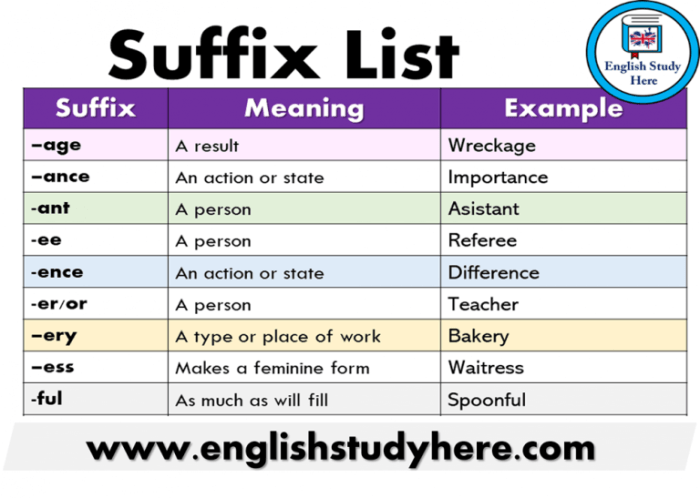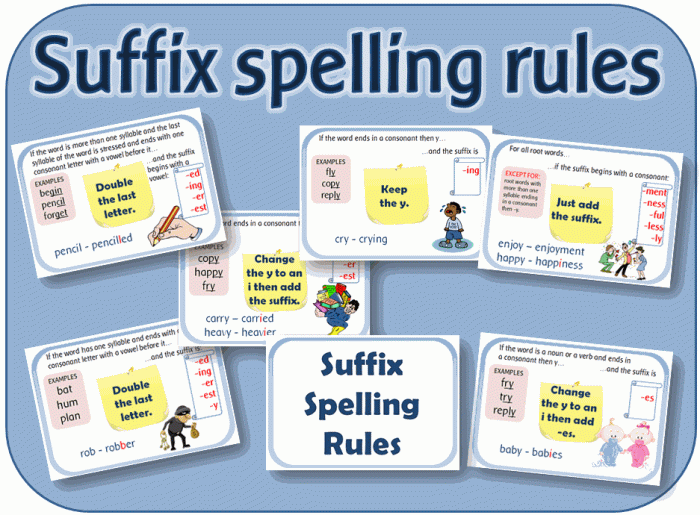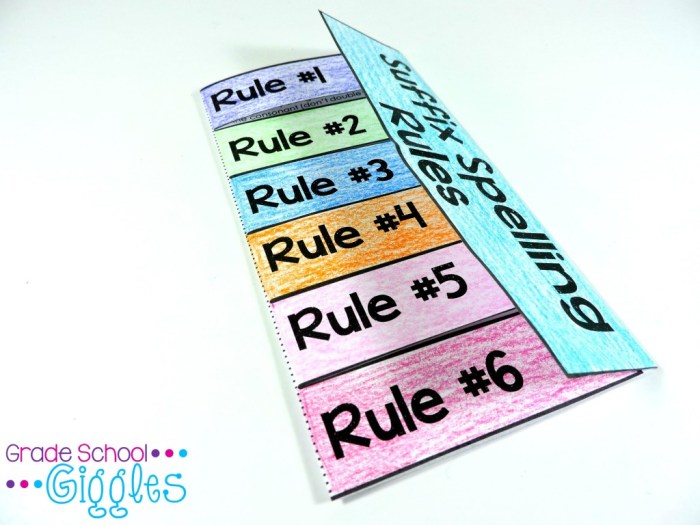Words with the suffix ward – Words with the suffix -ward, such as backward, forward, and upward, are ubiquitous in the English language. These words hold a wealth of meaning and nuance, and their usage can greatly enhance the clarity and precision of our communication. In this exploration, we will delve into the fascinating world of words with the suffix -ward, uncovering their definitions, etymology, and diverse applications.
These words are formed by adding the suffix -ward to a noun, verb, or adjective, and they typically denote direction, position, or tendency. By understanding the nuances of these words, we can effectively convey our thoughts and ideas, adding depth and richness to our written and spoken language.
Definitions and Meanings: Words With The Suffix Ward

Words with the suffix “-ward” are adverbs that indicate direction or position. They are formed by adding the suffix “-ward” to a noun or adjective. For example, the word “forward” is formed by adding the suffix “-ward” to the noun “fore.”
The word “forward” means “in or toward the front.”
Here are some other examples of words with the suffix “-ward” and their definitions:
- Backward: in or toward the back
- Downward: in or toward a lower position
- Eastward: in or toward the east
- Homeward: in or toward home
- Outward: in or toward the outside
- Upward: in or toward a higher position
- Westward: in or toward the west
li>Inward: in or toward the inside
The suffix “-ward” is derived from the Old English word “weard,” which means “direction.” The suffix “-ward” is also used in some compound words, such as “toward” and “backward.”
Usage and Examples

Words with the suffix -ward are versatile and can be used in various ways in sentences. They typically indicate direction, position, or tendency.
Here are some common ways words with the suffix -ward are used:
- Direction:Words like “forward,” “backward,” “upward,” and “downward” indicate the direction of movement or position.
- Position:Words like “inward” and “outward” describe the position of something relative to a central point or boundary.
- Tendency:Words like “homeward” and “earthward” indicate a tendency or inclination towards a particular place or direction.
Examples of Sentences
Here are some examples of sentences that use words with the suffix -ward correctly:
- The car moved forward slowly.
- The bird flew upward towards the sky.
- The passengers looked inward at the passing scenery.
- The boat drifted outward towards the open sea.
- The hikers walked homeward after a long day’s trek.
Grammatical Rules and Conventions
Using words with the suffix -ward follows specific grammatical rules and conventions:
- Words with the suffix -ward are typically adverbs.
- They can be used to modify verbs, adjectives, or other adverbs.
- When used with verbs, they describe the direction or manner of the action.
- When used with adjectives, they indicate the degree or extent of the quality.
- When used with other adverbs, they modify the meaning of the adverb they are modifying.
Word Formation and Derivation
Words with the suffix -ward are formed by adding -ward to a noun, adjective, or verb.
When added to a noun, -ward means “in the direction of” or “toward.” For example, the word “forward” means “in the direction of the front.” When added to an adjective, -ward means “in a direction that is consistent with the adjective.”
On the topic of words with the suffix -ward, it’s interesting to consider the practical application of this suffix in the automotive industry. For instance, have you ever wondered why brake lines are coiled ? This design choice is not merely for aesthetics but serves a crucial purpose in ensuring the proper functioning of the braking system.
Returning to the topic of -ward, it’s fascinating to explore how this suffix denotes direction or movement in various contexts.
For example, the word “upward” means “in a direction that is consistent with up.” When added to a verb, -ward means “in a direction that is consistent with the verb.” For example, the word “backward” means “in a direction that is consistent with back.”
Examples of How Words with the Suffix
ward Can Be Used to Create New Words and Phrases
ward Can Be Used to Create New Words and Phrases
- The word “forward” can be used to create the new words “forward-thinking” and “forward-looking.”
- The word “upward” can be used to create the new words “upward-bound” and “upwardly mobile.”
- The word “backward” can be used to create the new words “backward-looking” and “backward-compatible.”
Semantic and Syntactic Relationships Between Words with the Suffix
ward and Their Root Words
ward and Their Root Words
Words with the suffix -ward have a semantic relationship with their root words. The meaning of a word with the suffix -ward is typically related to the meaning of its root word. For example, the word “forward” means “in the direction of the front,” which is related to the meaning of its root word “front.”
Words with the suffix -ward also have a syntactic relationship with their root words. Words with the suffix -ward can be used as adverbs, adjectives, or nouns. The part of speech of a word with the suffix -ward is typically determined by the part of speech of its root word.
For example, the word “forward” can be used as an adverb, adjective, or noun because its root word “front” can be used as an adverb, adjective, or noun.
Variations and Synonyms

The suffix -ward exhibits several variations, each carrying subtle nuances and connotations.
Suffix Variations, Words with the suffix ward
- -wards: This variation is typically used in formal or archaic contexts. It conveys a sense of direction or movement towards something.
- -wardly: This variation is more common in informal settings and often implies a gradual or habitual movement or tendency.
Synonyms
Words with the suffix -ward often have synonyms that share similar meanings but may differ in their connotations or usage.
- Forward: Synonymous with “towards the front,” it suggests progress or advancement.
- Backward: Synonymous with “towards the rear,” it implies regression or decline.
- Upward: Synonymous with “towards a higher position,” it signifies growth or elevation.
- Downward: Synonymous with “towards a lower position,” it indicates decline or descent.
- Inward: Synonymous with “towards the interior,” it implies introspection or self-reflection.
- Outward: Synonymous with “towards the exterior,” it suggests extroversion or expansion.
Historical and Cultural Context

Words with the suffix
- ward have a rich historical and cultural significance. They have been used in literature, art, and other cultural artifacts for centuries to convey a sense of direction, movement, or position. The suffix
- ward is derived from the Old English word “weard,” which means “toward” or “in the direction of.” This suffix has been used to create a wide variety of words, including forward, backward, upward, downward, and homeward.
In Literature and Art
Words with the suffix
- ward have been used in literature and art to create a sense of movement and direction. For example, in William Shakespeare’s play “Hamlet,” the character Hamlet says, “I am bound for England, where I will drink hot ale and eat a good piece of beef.”
The use of the word “bound” in this sentence creates a sense of movement and direction, as Hamlet is traveling to England. In art, words with the suffix
- ward have been used to create a sense of perspective and depth. For example, in the painting “The Starry Night” by Vincent van Gogh, the use of the word “upward” creates a sense of movement and depth, as the viewer’s eye is drawn to the stars in the sky.
Evolution of Words with the Suffix
ward
ward
The suffix
- ward has evolved over time, and its meaning has changed slightly. In Old English, the suffix
- ward was used to create words that meant “toward” or “in the direction of.” However, over time, the suffix
- ward has come to be used to create words that mean “in the direction of” or “toward a particular place.” For example, the word “forward” originally meant “toward the front,” but it now means “in the direction of the front.”
The evolution of words with the suffix
- ward has had a significant impact on language and society. The suffix
- ward has allowed us to create a wide variety of words that can be used to convey a sense of direction, movement, or position. These words have been used in literature, art, and other cultural artifacts for centuries, and they continue to play an important role in our language today.
Detailed FAQs
What is the meaning of the suffix-ward?
The suffix -ward generally indicates direction, position, or tendency.
How are words with the suffix-ward formed?
Words with the suffix -ward are typically formed by adding -ward to a noun, verb, or adjective.
What are some examples of words with the suffix-ward?
Examples include backward, forward, upward, homeward, and skyward.